From a very young age, Liz Murray is hyperaware of sex and sexuality all around her. Each stage of her life reflects a different view of sexuality, and indeed, her coming-of-age can be interpreted in terms of her changing relationship to sexuality.
While Liz is still young, she’s aware of sex, but she sees it in an almost entirely negative light. Sex symbolizes danger: the dangers of sexual predation and, a little later, the dangers of AIDS and other sexually transmitted diseases. As a child, Liz (along with her sister, Lisa Murray) is sexually abused by a man named Ron, a friend of her mother. While Liz doesn’t discuss her abuse at great length in her memoir, she grows up associating sex with cruelty and the abuse of power. At the time when the book is set, furthermore, the AIDS crisis had already claimed many thousands of lives. Tragically, the open-minded culture of “free love,” a staple of the Greenwich Village scene at the time when Ma and Daddy met, made young, sexually adventurous New Yorkers particularly at-risk for this deadly disease. (See Background Info.) Liz doesn't clarify, or even know, how her parents contracted AIDS—whether it came from drug use or unprotected sex. But because of the looming threat of AIDS, she grows up unusually aware of sex, and thinks of it as a dangerous, even deadly thing.
One of the most disturbing things to which Liz is exposed as a child is the concept of sex as a kind of currency. During the time when Ron abuses her, for example, Liz hesitates to tell her mother the truth for a simple, painful reason: Ron “made things better” for Liz and her family. Even as a child, she senses that she is receiving something in “exchange” for her sexuality, in this case the food, shelter, and money Ron provides. Liz suffers sickening abuse at Ron’s hands. But, tragically, she has conflicted feelings about this abuse: she despises Ron but she likes the material support he gives her and her family.
As Liz grows older, she sees echoes of this disturbing, coercive arrangement in the way her mother interacts with other men and, later, the way Liz herself interacts with her boyfriends. While Liz is in middle school, for example, her mother begins living with a man named Brick. Ma and Brick fight but, as Liz notices even at the time, Ma never leaves Brick because she’s financially dependent on him—her economic security is bound up with her sexuality, leading to a drastic power imbalance in the relationship. Later, when Liz begins dating Carlos Marcano, she becomes accustomed to Carlos paying for her food and lodgings. Even after Carlos becomes neglectful and frightening, Liz feels trapped in the relationship. When she’s lonely or depressed, she turns to Carlos for comfort, even though Carlos is one of the causes of her loneliness. In both of these cases, a woman becomes financially dependent on a man and is pressured into preserving the relationship because of financial concerns, rather than her feelings. For many years, this is the only kind of sexual relationship Liz is aware of.
The turning point in Breaking Night comes when Liz begins to strive for independence in her own life, with her own money, and—not at all coincidentally—her own sexuality. No longer willing to enter into coercive relationships with men, she strives to make a living, get an education, and support herself materially and emotionally. During her time at the Humanities Preparatory Academy, Liz alludes to the boyfriends she has, but she also emphasizes that they don’t preclude her from pursuing success or limit her freedom in any way. Because she doesn’t rely on them for any material thing, she avoids confusing emotional dependence with economic dependence, as people do throughout her memoir. Because of her overall independence, furthermore, her view of sexuality has grown to the point where she sees it as a pleasurable thing, rather than something inherently dangerous or coercive. In sum, sexuality is a particularly important aspect of Liz’s struggle for independence. By taking control over her own sexuality and relationships, she takes control over her own life.
Sex and Power ThemeTracker

Sex and Power Quotes in Breaking Night
I told Ma all but one detail—the fact that I knew it was wrong. I knew that all I had to do to end it was to call out for her. But I didn't, because Ron made things better for Ma, for Lisa and me. I didn't want to ruin that, so I failed to call out.
"Who was that?" I'd do my best not to sound accusing. Always it was a cousin, a neighbor, or a friend's girlfriend.
"My friend's girl, ain't she a sweetheart," he'd explain. "I might check them for dinner, she just gave me the address." And always, the explanation was a concrete wall that I could not penetrate. The more I persisted, the more I might draw attention to myself. Better to let it slide; he cared about me, I was certain.
There was no pain involved, only the weight of his heavy body, the strong smell of latex and of his hot breath. To my surprise, my first thought was that being with him was emptier that I'd expected, more function than joy.
Turns out people could just vanish. I couldn't help but sit there and think about the woman who'd been murdered a few feet from my room. How had she gotten there, in a seedy motel room with a violent man who claimed he loved her? And was I really any different?
"Lizzy, I left any dreams behind a long time ago, but I know now that they are safe with you. Thank you for making us a family again."











